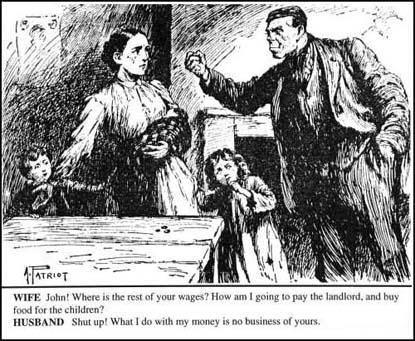
The Married Women's Property Act of 1870 gave married women liimited separate protection to own property and the money they earned up to f200. While the law did not even begin to give women the equality they deserved, the Married Women's Property Act of 1870 laid the groundwork for women's future rights.
Before 1870 married women had no claim to their personal or real property nor did they have the rights to the income they earned. The husband was in complete control and could do as he pleased with his wife's property and income. This however only concerned married women's property as the laws were different for single women. Single women could own their property and income by once a woman married, she lost the rights to her income and property. There were two exceptions to a married woman's ownership of her property and income. The first exception being the dowry provided by the bride's father or by the groom's father for support of the bride and her children. The other exception was that it was only available to the extremely wealthy women who were able to put their property in to a trust for herself and her children. This did not happend often due to the extreme costs involved to create a trust.
Mrs. Garth would have gladly given her savings and anything necessary to help Alfed get his apprenticeship. During this time period it would not have mattered if Mrs. Garth had not wanted to give up her wages, savings, and anythign necessary to help her son, Alfred. Her husband, Caleb Garth, had every legal right to take what was his and society would expect nothing less. Mary Garth may not have been legally required to give her wages over to her father as she was a single woman. Mary being the sensible, considerate, family oriented woman she was, she gladly gave all of her savings to her father to help.
It is clear George Eliot wrote Middlemarch with women's rights on her mind. Eliot's imagination brings fictional character to life while blending real historical events with fiction to portray life in Middlemarch.
"Married Women's Property Act 1870." Wikipedia, Wikimedia Foundation, 14 July 2020, en. wikipedia.org/wiki/Married_Women's Property_Act_1870.
"History: British History Timeline." BBC, BBC
